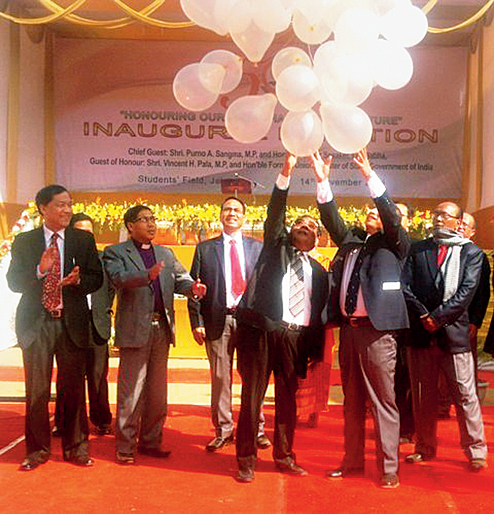 |
| (Top) Tura MP Purno Sangma releases balloons at Students’ Field, Jaiaw, in Shillong on Friday and (below) Sangma addresses the gathering at Synod College. Telegraph pictures |
Shillong, Nov. 14: Invoking past and present legends of the Northeast, veteran parliamentarian Purno Agitok Sangma today stated that people of the region are “not second class citizens” while urging the youth to “compete” and pursue “quality education” to change India.
Sangma made the comments while addressing students during the inauguration of the year-long golden jubilee celebrations of Synod College here.
The Tura Lok Sabha MP, in a way, also launched his “personal” golden jubilee year as he first stepped foot into Shillong in 1965 when he got admitted to St Anthony’s College.
Speaking of atrocities committed on the people of the region who are staying in the country’s metros, Sangma said, “Today, you hear of many atrocities on the people of the Northeast living in other parts of India. There are many reasons (for this), but one of the reasons is that our boys and girls have been able to successfully compete and are today occupying so many positions.”
 |
Invoking the names of former Lok Sabha deputy Speaker Prof. G.G. Swell, former Shillong MP Hoover Hynniewta and former chief election commissioner James Michael Lyngdoh, who have made a mark in the country’s political and administrative map, he said, “We are no less than others. How are we second class citizens? We are first class citizens. Many people from the region like M.C. Mary Kom and others are shining. You can shine too.”
While inspiring the students, he cited the ongoing Indian Super League, where every team has players who hail from the Northeast.
Recalling Prime Minister Narendra Modi’s tryst at the Madison Square Garden, the veteran parliamentarian took the students to America.
“I want to take you to Madison Square Garden where our Prime Minister recently addressed a large crowd. He had said that no country has the advantage that India has: “the three Ds — democracy, demand and demographic dividend,” Sangma said at Students Field, Jaiaw, adjacent to Synod College.
Reminding that Indian democracy is 67 years old, he said, “No other democracy in the developing world has preserved democracy unlike India. It has come to stay. It is yet to come to China, but democracy will come to China too.”
He said, “We have a market of 1.2 billion people. Whatever is produced in India, we do not have to sell it outside, as it is not enough for our own country. China also has got that, but without democracy.”
However, Sangma said that the country’s biggest advantage is its demographic dividend.
“India is the youngest nation in the world in the sense that India belongs to you, the youth. The National Sample Survey Organisation came out with a report that in 2004-05, our country had a non-working workforce of 30 million. This has grown to 60 million in 2010. No country has got that much,” the former Lok Sabha Speaker said.
At the same time, he said, as per the Human Development Index report of the UN, this educated section which will join the work force will grow by 32 per cent in India in the next 20 years. In America and Europe, it will decline by 4 per cent. In China, he said it would decline by 5 per cent.
“This is our strength. You, the young people, are the strength of India. But are you sincerely preparing yourselves for the future?” he asked.
Sangma was blunt in stating that perhaps the people from the region do not pursue “quality education”, but are satisfied with “education” only as everything is “readymade”.
“We, the tribal people in the Northeast, go for education, not for quality education perhaps because we get everything readymade. Admissions, scholarships, higher studies, jobs are all ensured. So quality education is not required,” he said.
However, he said the future was going to be “different”.
“My message to you is to compete. The jobs in the reserved areas in the government sector are drastically shrinking, but jobs where there is no reservation (in the private sector) are tremendously growing. Can we, as tribals, compete to meet the challenges? Yes, very much,” he added.










